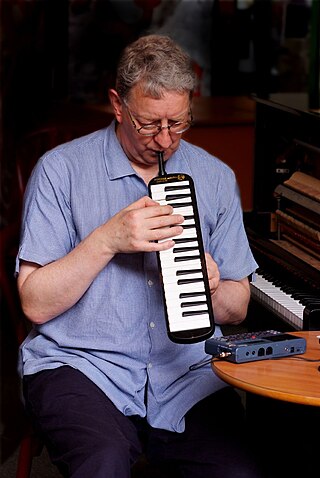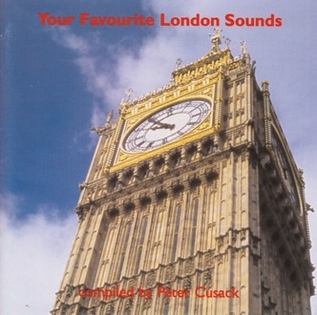Related Research Articles

Steve Beresford is a British musician who graduated from the University of York He has played a variety of instruments, including piano, electronics, trumpet, euphonium, bass guitar and a wide variety of toy instruments, such as the toy piano. He has also played a wide range of music. He is probably best known for free improvisation, but has also written music for film and television and has been involved with a number of pop music groups.
Ambient techno is a subgenre of techno that incorporates the atmospheric textures of ambient music with the rhythmic elements and production of techno. It was pioneered by 1990s electronic artists such as Aphex Twin, Carl Craig, The Orb, The Future Sound of London, the Black Dog, Pete Namlook and Biosphere.
Glitch is a genre of electronic music that emerged in the 1990s which is distinguished by the deliberate use of glitch-based audio media and other sonic artifacts.
Nicolas Collins is a composer of mostly electronic music, a sound artist and writer. He received his BA and MA from Wesleyan University, and his PhD from the University of East Anglia. Upon graduating from Wesleyan, he was a Watson Fellow.
A soundscape is the acoustic environment as perceived by humans, in context. The term was originally coined by Michael Southworth, and popularised by R. Murray Schafer. There is a varied history of the use of soundscape depending on discipline, ranging from urban design to wildlife ecology to computer science. An important distinction is to separate soundscape from the broader acoustic environment. The acoustic environment is the combination of all the acoustic resources, natural and artificial, within a given area as modified by the environment. The International Organization for Standardization (ISO) standardized these definitions in 2014.
The London Musicians Collective (LMC) is a cultural charity based in London, England devoted to the support and promotion of contemporary, experimental and improvised music.

David Toop is an English musician, author, curator, and emeritus professor. From 2013 to 2021 he was professor of audio culture and improvisation at the London College of Communication. He was a regular contributor to British music magazine The Wire and the British magazine The Face. He was a member of the Flying Lizards.
Sound art is an artistic activity in which sound is utilized as a primary medium or material. Like many genres of contemporary art, sound art may be interdisciplinary in nature, or be used in hybrid forms. According to Brandon LaBelle, sound art as a practice "harnesses, describes, analyzes, performs, and interrogates the condition of sound and the process by which it operates."
Musics was a music-related magazine that was published from 1975 to 1979.
Sonic Arts Network was a UK-based organisation, established in 1979, that aimed to enable both audiences and practitioners to engage with the art of sound through a programme of festivals, events, commissions and education projects. Its honorary patron was Karlheinz Stockhausen. At time of founding in 1979 it was known as the Electroacoustic Music Association of Great Britain (EMAS), changing its name to Sonic Arts Network in 1989.
Hildegard Westerkamp is a Canadian composer, radio artist, teacher and sound ecologist of German origin. She studied flute and piano at the Conservatory of Music in Freiburg, West Germany from 1966 to 1968 and moved to Canada in 1975. She received a Bachelor of Music from the University of British Columbia in 1972 and a Master of Arts from Simon Fraser University in 1988. She taught acoustic communication at Simon Fraser University from 1982 to 1991.

Pamela Z is an American composer, performer, and media artist best known for her solo works for voice with electronic processing. In performance, she combines various vocal sounds including operatic bel canto, experimental extended techniques and spoken word, with samples and sounds generated by manipulating found objects. Z's musical aesthetic is one of sonic accretion, and she typically processes her voice in real time through the software program Max on a MacBook Pro as a means of layering, looping, and altering her live vocal sound. Her performance work often includes video projections and special controllers with sensors that allow her to use physical gestures to manipulate the sound and projected media.
Ron Haselden is a British artist who splits his time between London and the French coastal town of Plouër-sur-Rance, in Brittany, France. He works with light, sound, film and video, often as part of architectural projects.
Max Eastley is a British visual and sound artist. He is part of the Cape Farewell Climate Change project. He studied painting and graphic art at Newton Abbot Art School and then went on to gain a BA in Fine Art (1969–1972) at Middlesex University. He is a sculptor (kinetic), musician and composer. His primary instrument is a unique electro-acoustic monochord, developed from an aeolian sculpture. 'The Arc' consists of a single string stretched lengthwise across a long piece of wood which can be played with a bow, fingers or short glass rods. The end of the instrument has a microphone attached so the basic sound can be amplified, recorded and run through sound effect programs.
The Konkrete Etüde is the earliest work of electroacoustic tape music by Karlheinz Stockhausen, composed in 1952 and lasting just three-and-a-quarter minutes. The composer retrospectively gave it the number "1⁄5" in his catalogue of works.
Realised between 2002 and 2004, the project Sonic City was pioneer projects in locative media, in particular the mobile music field which it contributed in establishing.
Alterations is a four-piece musical group with members David Toop, Peter Cusack, Terry Day, and Steve Beresford. Initially active from 1977 to 1986, the group released three albums and performed widely across the UK and mainland Europe. The group play free improvised music with an emphasis on unusual combinations of different styles. "The group were notorious for genre-plundering humour."

Jewels of the Sea is a 1961 orchestral exotica album by American composer Les Baxter. The album was inspired by fantasy ideas of the ocean from pop culture, such as mermaids and sea nymphs, sunken ships, and legendary underwater cities such as Atlantis. There was an overall erotic element to the album, whose tagline was "Titillating Orchestrations for Listening and Loving", and whose original cover featured actress and model Diane Webber smiling glamorously underwater, apparently naked. Although not explicitly shown wearing a mermaid tail, her makeup and jewellery are styled to be reminiscent of the performing mermaids at Weeki Wachee Springs.
Matthias Osterwold is a German culture manager.

Your Favourite London Sounds is an album compiled by English musician Peter Cusack and released in November 2001 by the London Musicians Collective (LMC). It collects 40 field recordings of sounds around the English city of London, most of which were recorded by Cusack. The project originated when the LMC hosted a temporary radio station for the 1998 Meltdown Festival, which Cusack used to ask festival goers and listeners what their favourite 'London sound' was. He received hundreds of responses, many of which were varied and often personal.
References
- Haunted Weather: Music, Silence, and Memory, David Toop, Serpent's Tail, 1 July 2004, ISBN 1-85242-812-0